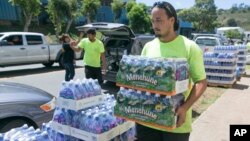Plastic pollutes environment. That’s the message of Ban the Bottle, an environmental group that is urging Americans to ditch the plastic.
Every day, Americans go through 50 million plastic water bottles. And it takes more than 17 million barrels of oil to meet our demand for bottled water, since most plastics are derived from petroleum.
That’s enough energy, says Ban the Bottle, to fuel more than a million cars and power nearly 200,000 homes every year. Never mind how much oil used to transport plastic bottles from one part of the country to another.
In spite of active recycling programs, only about 23 percent of these bottles end up being re-used.
“Plastic recycling rates are lower in states that don’t have a recycling fee and most states don’t have fee in place. People usually don’t recycle when it doesn’t offer them a monetary return,” Schutten said.
Bottles that aren’t recycled end up in landfills, lakes, streams and even oceans.
Every ocean has its garbage patch – large masses of plastic refuse that collect and swirl with the current. But the Pacific patch is bigger than all the rest. It’s not exactly a solid mass, but several groupings.
“The amount of plastic in the Great Pacific Garbage Patch is estimated by scientists to be twice the size of Texas floating between Hawaii and California,” said Julie Schutten, an associate professor communication and environmental cultural studies at Northern Arizona University.
So, what’s the alternative?
Tap water.
“We live in a country were most households have clean drinkable water, and we don’t need plastic bottled water. We did just fine 25 years ago before water was a bottled commodity,” Schutten said.
Besides, she added, “much of the water sold to us in plastic water bottles is less regulated than water from the tap in many U.S homes.”
Policymakers are getting the message. This year San Francisco became the first city in America to ban the sale of plastic water bottles on city-owned property. The town of Concord, Massachusetts has enacted a law banning the sale of drinking water in all bottles one liter and smaller, except during city emergencies. In 2008, Chicago implemented a five cent tax on bottled water.




